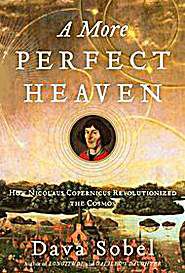‘Perfect Heaven’ lends drama to Copernicus’ solar discovery
Published 5:00 am Sunday, October 23, 2011

- 'Perfect Heaven' lends drama to Copernicus' solar discovery
“A More Perfect Heaven: How Copernicus Revolutionized
the Cosmos” by Dava Sobel (Walker, 273 pgs., $25)
Dava Sobel has long taken a quirky approach to science history. In “Galileo’s Daughter” (1999), for instance, she focused not on the standard biographical material but on the scientist’s love for his illegitimate daughter, consigned to a convent at 13 and dead of dysentery at 33.
“A More Perfect Heaven,” her new biography of the Renaissance astronomer Nicolaus Copernicus, is no exception. It begins with a “Prelude,” six chapters of conventional narrative. Part Two, “Interplay,” consists of a literal play, “And the Sun Stood Still.”
Again without fanfare, in Part Three, “Aftermath,” she returns to conventional narrative, following the fate of Copernicus’ work long after his death, in 1543. Originally, she tells us, she intended the play to stand alone. Perhaps wisely — though unconventionally — she has provided needed context.
In 1539, when Copernicus was 66, an audacious young acolyte named Rheticus showed up on his doorstep. What happened over the next two years is crucial to Copernicus’ legacy but mostly lost to history. Sobel relies on available resources and her own imagination to create a moving, plausible account of how the reluctant old man was at last persuaded to offer his revolutionary sun-centered theory of the universe to a public that had no inkling the center was anything but Earth.
Copernicus had “leapt” to the idea in 1510, Sobel writes, “via intuition and mathematics.” Once the sun had replaced Earth as the center of the universe, “the planets snapped into a new logical order,” arraying themselves “outward from the Sun according to their speed of revolution.”
“Everything fit,” she continues. “No wonder the beauty of the system prevailed over the absurdity of the Earth’s motion.”
Sobel’s play-within-a-book opens with Rheticus asleep on Copernicus’ doorstep and then mistaking the old man for a thief. She imagines the dialogue and interactions between Copernicus and his protege, as well as with the suspicious bishop; his devoted and alarmed housekeeper; and Franz, the young boy who serves as the bishop’s messenger and spy.
Shortly after, Copernicus discovers Rheticus and Franz in flagrante. Copernicus fears for his own life as well as Rheticus’ if the act is discovered, and sends him away. And this is where fact and dramaturgy seem to part ways.
Their work isn’t done, Rheticus protests, but Copernicus stands firm. As Rheticus leaves, the few completed chapters in hand, Copernicus appears to suffer a stroke: “May God be w… w…” he tries to say. “His right arm falls to his side,” according to the stage directions, “but he still clutches the manuscript to his chest with the left as he sinks into a chair.” Blackout.
In the following scene, Franz dashes to Copernicus’ bedside, the completed manuscript in hand. There is no indication how much time has passed, and we are left to believe that the stroke that would kill him is the one we have seen him suffer. As the pages are handed to Copernicus, he breathes his last.
It makes for good drama, but does it make for good history? Rheticus was accused by the father of a Leipzig student of practicing “upon him the shameful and cruel vice of sodomy,” so perhaps Sobel’s use of this particular indiscretion is justified. But Rheticus in fact did not stay away long. The Duke of Prussia granted him permission to return, and he and Copernicus worked together for two years.
The facts of the story, and Sobel’s elegant and authoritative writing, would have been sufficient unto themselves. The play is a clever device, but it raises more questions than it answers. She begins the chapter following the play this way: “No one knows what the brilliant, fervent young Rheticus said when he accosted the elderly beleaguered Copernicus in Frauenberg. It is safe to assume he did not laugh at the idea of the Earth in motion.” So why did she make Rheticus incredulous on hearing Copernicus’ theory?
A former reporter for The New York Times, Sobel is an elegant stylist, a riveting and efficient storyteller, a writer who can bring the dustiest of subjects to full-blooded life — poignant, in the case of Galileo; cautious but also loving, loyal and feisty in the case of Copernicus. Why fool with the facts, when they themselves are so compelling?






